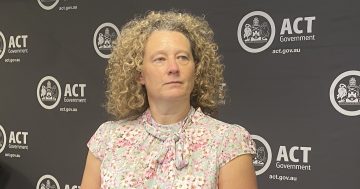
Acting Chief Health Officer Dr Vanessa Johnston last week claimed information about the vaccination status of COVID-19 patients in hospital was already included in weekly epidemiological reports. Photo: Michelle Kroll.
ACT Health says it can now begin issuing more detailed weekly epidemiological reports, including a breakdown of hospitalisation data, and the vaccination status of hospitalisations and deaths, despite last week claiming that releasing this information would breach patient privacy.
Acting Chief Health Officer Dr Vanessa Johnston stated last week the release of vaccination or comorbidity information in the ACT context is more complex than in other jurisdictions due to the small size of the ACT and the low number of both deaths and hospitalisations.
She also said the department would not release information unless it was in the public interest to do so – and she did not believe releasing a geographical breakdown of case spread would be useful, either.
A spokesperson for the department said officials were still working through how best to present the information on the vaccination status of COVID-19 hospitalisations and deaths to “balance the public release of information alongside patients’ rights to privacy”.
Despite privacy concerns aired last week, the spokesperson now said the department would look to report information through de-identified “datasets of a sufficient size so as to not identify individuals”.
However, it’s unlikely comorbidity data will be reported, given this is not “routinely collected”.
“Standardised comorbidity data is not routinely collected as part of jurisdictional and national surveillance data collection and reporting processes. ACT Health will continue to explore the possibilities of reporting comorbidity data into the future,” the spokesperson said.
The department expects more detailed reports will be provided to the public via the COVID-19 website from Friday (1 April).
When compared to jurisdictions like NSW and Tasmania, ACT Health’s weekly epidemiological report has, until this point, been much considerably less detailed and much shorter – one page compared to 26 and nine, respectively.
The information included in the Territory’s report has often non been provided in a standardised manner, making it difficult to make comparisons.
Tasmania provides a weekly breakdown of cases by region, local government area and age group. Its weekly reports also give the vaccination status of individuals who are hospitalised, admitted to ICU or who die with COVID-19, as well as statistics about how many hospital patients are being treated for COVID-19 symptoms versus how many are in hospital for other reasons.
When a person dies with the virus, their vaccination status is also made public.
The change in reporting comes after emails released under Freedom of Information laws last week showed health bureaucrats held concerns about how information about comorbidities and the vaccination status of individuals who died with or were hospitalised with COVID-19 would be interpreted by the public.
But ACT Health said the reason for the change in weekly reporting was due to “the COVID-19 situation at the time, national surveillance requirements, feedback from the community and technical capability”.
They also attributed it to a change in “technical reporting capability”, which took place in November 2021 when a new notifiable disease management system was activated.

Opposition spokesperson for health Leanne Castley accused ACT Health of fostering a ‘culture of secrecy’. Photo: Region Media.
The Opposition last week accused ACT Health and the Minister, Rachel Stephen-Smith, of fostering a “culture of secrecy” – a claim ACT Health and Ms Stephen-Smith strenuously deny.
Today, Canberra Liberals’ spokesperson for health Leanne Castley called ACT Health’s decision a “stunning backflip” after Ms Stephen-Smith last week spent time “defending her government’s culture of secrecy and denying Canberrans the right to know important COVID-19 information that is provided in other states”.
Ms Castley said she was pleased the minister had “bowed to public pressure to release this COVID data instead of this arrogant government continuing to keep Canberrans in the dark”.
Health officials and Ms Stephen-Smith have flatly rejected suggestions that any information was deliberately concealed from the public.




















